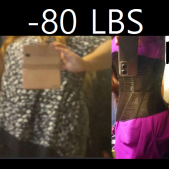Search the Community
Showing results for '"Weight gain"'.
Found 15,901 results
-


Should I have the surgery?
SmolGojira replied to GreatHope's topic in General Weight Loss Surgery Discussions
I don't think anyone here can really tell you if you should or shouldn't as it's a forever decision and some people might not be suitable for it. You just need to be 100% honest with yourself and what you want in life and what you're happy to sacrifice to have it. But I will be brutally honest with you and tell you my experience. Are you happy to spend the rest of your life unable to eat normal size meals? Are you happy spending the rest of your life prioritizing nutrition and protein and avoiding high calories/high sugar foods? You'll even have to monitor when you eat and drink as you can't do both at the same time. These are some things people don't realize you will have to do. I think there's a big misconception out there that you get the surgery, and the weight just falls off and you don't have to do anything but it's so far from that, people do fail with this surgery, people do stay obese and some even gain the weight back once they've lost a little, it happens. You will struggle, you will have to see a nutritionist, you will have to learn to eat right, you have to learn to focus on getting as much protein as possible and if you eat sugar and chocolate and cakes, the weight will just come right back only this time you'll also have deficiencies. Even so, it's not a bad thing. I think all of that is a lot easier than being obese and I'm happy to have this as a life, if it means I can run without knee pain. Also there's more deaths caused by obesity than the surgery, having the surgery adds years to your life, just make sure you go to a legit surgeon. I wanted the surgery 12 years ago, when i was only 215lbs, had 0 stretch marks and was still pretty young, but many people talked me out of it and I decided to go hard core instead and crash dieted my way to 150lbs, within a year I was at 200lbs again and then after another year 250lbs, then crash dieted again to 175lbs, then I went all the way up to 265lbs and yoyo'd like that for 7years. My weight gain had started when I met my now ex, before I met him I was tiny and fit, it took me many months of therapy after I left him, to find out I was dating a narcissist that was feeding me to keep me fat and then using my weight as justification to hurt me and call me names... and prevent me from leaving him thinking i wasn't good enough for anyone. Every time I had lost the weight in the past, he would freak out and make me feel bad, accuse me of trying to get fit to leave him and that was part of the reason I think I yoyo'd so bad. I was doing it for the wrong reasons, and i lived with someone that enjoyed watching me in pain. So the dieting would have never worked. I got the surgery thinking that it would be the end of arguments and part of me thought it would make him happy in the long run and things would change but no, our relationship ended and now I'm actually glad, because if I had stayed with him, even with the surgery, I'd still be obese. Am I happy I had it done? Yes, but there's times when I'm sad I can't just eat a normal meal at a restaurant, thankfully you can take left overs home and eat the rest as another meal later . There's people that will never understand and will say you cheated, talk behind your back and just be rude. It's gotten to the point I don't tell anyone I had the surgery because I'm tired of justifying it. Overall for me it was the right thing to do, even if i wasn't in the right mindset at the time, because it helped end a toxic relationship, it fixed my binge eating disorder, I got therapy and have been working on myself physically and mentally with the aim to maintain my health for life. I've still got a long way to go but i'm already feeling better about myself. I actually bought a corset for the first time in 10 years having loved them when i was younger... And it fit and looked good!!! My insurance wouldn't pay for the surgery, so i used all my life savings and I'm still happy I did. Take the time to really think about this, look at all the pros and cons. Decide if your reasons for wanting it are worth it. It is an amazing tool to help you lose weight and I think with the right guidance many people will benefit from having this done but you need to decided it you're one of them. Either way, if you decided to do the surgery or calorie count, we're always here to chat and support you. All the best on your journey to a healthier life. -


Hey 50 & over gang We have a new spot
Elayne replied to IndioGirl55's topic in LAP-BAND Surgery Forums
This is premature as I don't even have a surgery date set yet - but I'm so gosh-darn optimistic about this band thing and want to put my nervous energy to good use. :cool2: About the saggy baggy skin thing - Bellies, arms, thighs, etc. What is your experience with this - Can it be prevented - before and after surgery exercises? Have many of you opted for plastic surgery? My BMI is below 40 and I don't anticipate too much saggy baggy - Heck - I've had 3 full term pregnancies before this weight gain and it never bothered me greatly. To have waistline again and be able to tie a robe around the girth and not have my tummy enter the room 1 second before the rest of me will be in itself a dream-come-true. :thumbup: And to wear sleeveless tops would be nice if the upper arm flippy floppies aren't too bad. Are there any ongoing exercises to keep this at a minimum? Any feedback from anyone? :confused2: -


HELLO, any oldies out there? I'm almost 63 and want to live.
NM Sunshine replied to FatAttack's topic in Tell Your Weight Loss Surgery Story
Nina, You've had a rough time. I'll bet it is the stress that put the extra weight on. I was thin (a bit anorexic thin) before and after surgery. Years later did some minor yo yo dieting. 8 years ago I filed for divorce from an abusive man, married 37 yrs before divorce became final. It was surely the divorce from hell. It's lasted 8 years and still lingers on. It cost me $100,000.00 and left me so poor that I'm on Medicaid. He wanted to hurt me anyway he could as a way of punishing me for divorce. That was all major stress. I began at 125 pounds and began gaining in 2001. I got up to 198 but am now 179.5 and a long way to go. It was the stress that caused the weight gain. I've been reading about it and this type of stress (kind I have and kind you have) causes weight gain especially in the abdomen. -
Completely agree with you that hard exercise does not lead to continuous weight loss. It is too hard on your body and will stall out weight loss or cause weight gain. The body will struggle with too low carbs and calories that are needed to support weight loss in the context of high caloric burn from the hard exercise. Therefore, strive for moderation even in exercise while you are losing weight. Getting the diet balanced for weight loss with moderate exercise works really well for weight loss.
-
Tom: I hate prednisone! I gain more weight on that drug! I have Lupus. I guess for me I've resigned my self to some weight gain when I'm on it, and then back to losing. I'm trying to think of is as a little blip in the game plan and then right back at it. And it sounds to me like you know all the right moves in the meantime....getting to work for distraction purposes, getting back to the gym even if, like me, it's harder to do it when you feel yucky. I too know about that stack of dishes....and you know it's a temporary thing. Maybe if you're off work again today, you can think of somewhere to go for part of the day to break the grazing...movie? library? My thoughts are with you. It's just temporary.....
-


Anybody getting or have new BOOBS
BetsyB replied to Malisafos's topic in POST-Operation Weight Loss Surgery Q&A
I'm already researching plastic surgeons for all the work I am likely to need when I hit goal. Boobs top the list---they needed to be put back where they belong even before I started losing--big breasts + pregnancies + nursing + weight gain & loss = dire need of attention! -


Anybody getting or have new BOOBS
StevieVieth replied to Malisafos's topic in POST-Operation Weight Loss Surgery Q&A
Even when I was small I had DD boobs and not small DD's Large DD's almost popping out of my bra. My breasts are probably the only thing I like about my body now. Ive gone through the weight gain and loss all my life and it never really affected my chest area at all. I didnt breast feed my son because I was iron deficent anemic and I was on pain medication because he ripped in 3 spots. So the dr recommended that I didnt breast feed. Plus I also heard that it is terrible for your chest it actually causes them to sag and I love mine. What I am concerned about is my lower abdomen and my tattoos when I need a tummy tuck.:thumbup: -


is anybody out there suffering from pcos?
piercedphoenix830 replied to saritawillslim's topic in Pregnancy with Weight Loss Surgery
I have had PCOS for so long...when I was originally diagnosed it was called Stein-Leventhal Syndrome. I struggled 20 YEARS with it. Every single symptom, I have/had. Wls saved my life. I went from 6 insulin injections a day, to nothing. My PCOS helped me get high lipids, battle diabetes, high blood pressure, hair loss on my head, excessive hair growth everywhere else, extreme weight gain...I could go on and on. 2 years post vsg, my ONLY regret: that I didn't do the surgery sooner! 2 years post op, 188 pounds down, healthy, and 10 weeks pregnant! -
Scales, to weigh or not to weight. The scales can not always be your friend when losing weight. Everyone fluctuates 1-3 lbs daily from water weight gain. When you are doing the pre surgery diet, the goal is really not so much weight loss but shrinking the liver so when they do the surgery your liver is not in the way. In our anatomy the liver and stomach are very close and if the liver is enlarged it can prevent the physician from completing the procedure closed. In the beginning we all want that instant gratification of seeing the scale drop but for the long haul it is about results and a lot of our results are in inches not weight. As far as exercising during pre-surgery stages, your going to feel tired. Even now weighing 175 lbs it takes about 1700 calories just to maintain this weight if I wanted with little activity so if your only consuming 500-600 your body needs all of those calories just to maintain and when your exercising your body goes into starvation mode and holds onto every calorie because it needs it to provide energy to all your organs. Remember your heart is muscle and it needs protein also. Maybe taking a short walk in the evenings once or twice would be good but make it a nice walk, time to relax and center your self. Listen to relaxing music and prepare yourself mentally for the journey ahead. Your dedication to the pre-surgery diet will prepare you for the focus you need once your surgery is completed. Proud of you, you are doing great, the day is closer, only one week left.
-


Average age of a Bandster?
luluc replied to Kellster's topic in General Weight Loss Surgery Discussions
38. if i could have gotten the band placed to PREVENT the weight gain in the first place - i would have. -
I have BCBS and VA coverage- NEITHER of them would approve my surgery because of my BMI only being 31. I'm actually in great shape, and an athlete but my weight has always been on the obese side, and now I have so many complicating factors it's gotten ridiculous. I've been on insulin meds, hormone meds, stomach ulcer meds, etc. I also have Poly Cystic Ovary Syndrome which causes huge amount of weight gain and stomach issues at various points in the month. Every doctor I've consulted with have said this surgery will fix 99% of my problems, but NO insurance will cover this surgery because I'm not Morbidly Obese- so if I gained 30 more lbs and became full blown diabetic then they would pay... my logic is- why wait and torture my body, fix it now by a reputable doctor and save the last year of my 20's as not being miserably over weight. And maybe, just maybe I can get into the athletic shape of my life again and actually play my club sport like I use to 10 years ago minus all this extra baggage. :/ And yes, I'd love to be in the Alabama group- and of course and War Eagle!
-
1) Protein. I get 90% of my calories from pure protein. I completely avoid carbs like the black plague. I snack on chicken, and whatever I can get my hands on. Yesterday for lunch I had pulled pork bbq, 3 oz and I was done, saved the rest and ate it again for dinner. No sides, no bread, nadda. The bbq was more than enough. 2) Routine is my bff. I know what I'm going to eat every single day before I leave the house, I leave nothing for imagination and I workout with other people so even if I'm not feeling motivated to do it, I know they are waiting on me to show up- there for I actually do my workouts religously. 3) Here's the tough love. I commit to at least 1 FULL HOUR EVERY SINGLE DAY to working out. Math says it takes 3500 calories to burn 1 lbs of fat, even on a low calorie diet and your BMR helping to burn some calories that still a LOT Of calories that you need to burn. 4) READ the guru's. I've read Jillian Michaels and Bob Harpers books, I've read Oprah's trainers, I've read all the top hollywood trainers books. I've educated myself thoroughly and there are several key things THEY ALL AGREE ON: A) To lose weight you must work out a MINIMUM of 1 hour 6 days a week and it must be intense, not lolly gagging- doesn't matter if it's running, walking, elliptical or what you got to make it intense and get your heart rate to 120. B.) Weight lifting is NECESSARY. At least 3 times a week for 30 minutes at max weight. All the trainers said it, if you want to change your metabolism it starts with weights. Muscle burns more fat. There for increase your muscle. If you rotate a day of weight lifting for cardio, or add them both in for a 2 hour workout 6 days a week, magical things might happen. C) Carbs are the enemy. They all agree. We are a carb heavy society. And because of our sleeves now is the time to back away slowly and reconsider them later. Eat a very heavy protein diet. D) Sugars are the enemy. And you know what I'm talking about. Even the Protein shakes are full of crap. Time to step back drink h20 (and none of the other crap) and focus on Proteins again. I will miss my smoothies and my fudigcles and my occassional sweet tooth cravings, but do want to lose weight or not? E) DO NOT, I repeat DO NOT eat after 7pm. Water ONLY. sleeping on a full stomach, partially full, or any thing at all in your stomach will screw with your metabolism in your sleep. Just don't do it. Maybe masters swimming and water polo are my saving grace, but I know several people who've had success with trainers, workout buddies, etc. It's HARD. Period. No matter who we are to get this done. It takes time and commitment. I have PCOS (PolyCystic Ovary Syndrome which has been a huge factor in why I needed the VSG- my body cannot regulate my hormones or my insulin), and I have always gained between 7 and 10 lbs on my period (sorry guys for the TMI but weight gain is true for the vast majority of women). If I only fluctuate by a pound or so I will be delighted. So this week I'm easing up on myself and just training and ignoring my numbers as they will most likely go up. BE AWARE of your cycles and get a calendar. Start tracking on your calendar, calories consumed, when your period is, when your PMS'ing (which is when your hormones start to surge and the first onset of weight gain pre-period happens) and watch what happens. You might be bloating because you're so close to your cycle. I also get horrific acne- which right now is pretty bad :/ so that's my indicator mother nature is about to come kick my a$$. I work out a LOT. A minimum of 2 to 5 hours a day and that's why I've been dropping numbers. I know a lot of people cannot commit to that, but I'm doing with with a packed schedule and a kid because my health is #1. It's time for me. THIS IS MY TIME. And I don't have anymore time in my life to waste. I'm being as completely proactive as possible. Hope this helps!
-


Official Ongoing Gastric Sleeve Maintenance Thread
windycitymom replied to Oregondaisy's topic in WLS Veteran's Forum
Thanks so much feedyoureye! Can you share more about your experience on 5:2. It sounds like it is a permanent way of eating and not just a diet? I feel like every month I am craving carbs and making poor choices with little to no control or restriction and I've learned how to eat around my sleeve and I'm worried. Additionally, I feel like my body fat composition is changing significantly more than my mere 5-7 lb weight gain, so it is depressing me. I used to be a size 4 and now and a solid barely size 6. Overall, I'm still happy with that but do feel "heavy" like I used to before WLS. I just feel like I can "get away with it" and therefore I CAN make the poor choices that I'm making. Basically, I need a reality check and need to get my eating back in order so I'm thinking I need to do the Pouch/sleeve test and then do the 5:2. Can you share your experience with 5:2? what do you eat on your 5 days and what do you eat on your 2 days? Do you have a good official website? anything sleeve related to know about doing the 5:2? Thank in advance for sharing! Lisa -


Attention February 2013 Sleeve Buddies!
woman in me replied to LizTex2587's topic in Gastric Sleeve Surgery Forums
I'm Julie. Born and raised in Louisiana but married a Mississippi man and moved here to be with him. I'm 40 y/o. Married to my soul mate and mother of a 17 yr old son with special needs. I work 2 jobs. So life is stressful. I was thin and even a beauty queen in my younger years but weight gain begin in my early 20's. my first consultation is Jan 14 w Dr Borland in Louisiana. I'm self pay ($9800) and I am hoping to schedule my surgery Feb 26. I hope to lose 130-160 lbs. -
My pre op diet is very minimal like broth, and slim fast, decaf coffee, sugar free jello. I don't have a dietitian or nut, I did email my contact, she didn't seem too worried about the weight gain. I'm having surgery in Mexico and its a 15 hour drive for us, I don't want to get there and them not be able to do it that would be devastating!!
-
I have a gastric bypass RNY the following Thursday (22nd) and I've been on the pre-op diet for a week. I'm starving hungry too and also feeling anxious about the surgery. Covid means I have to go to the hospital on my own too and no visitors for the 2 nights I'm there - I agree having to be on my own is very daunting. I'm just trying to hold it together by reminding myself why I'm doing this - steady weight gain, yo yo dieting for years, high bp, arthritis, pre-diabetes. If I postpone it now, all routine ops here might be cancelled till who knows when if covid accelerates more, so I think as my decision is made, it's best to just do it now. Good luck!
-

December 2013 Sleever Pounds Lost Log
Kindle replied to RunningA5K's topic in Gastric Sleeve Surgery Forums
Exercise will also cause your body to retain fluids, so it could be both water and muscle weight gain counteracting the fat weight loss. Or just your basic, regular mini stall that has no rhyme or reason My trend over the last month and a half seems to be no loss for one or two weeks and then 1-2 pounds the next. Mixing up your activity will probably kick things up again. -


December 2013 Sleever Pounds Lost Log
DeezJeanz replied to RunningA5K's topic in Gastric Sleeve Surgery Forums
Honey, no worries. Ur doing amazing n its showing:). U have 5 months to reach your 100# loss in 6 mths, don't stress, cuz it causes weight gain. Just relax n let whatever happens happen. Remember its been many years since our bodies showed a loss such as is, so b patient and ur doing gr8, congrats!!! Now, when I'm impatient, u have to tell me the same, we are human, lol;) -


December 2013 Sleever Pounds Lost Log
Tarheel79 replied to RunningA5K's topic in Gastric Sleeve Surgery Forums
HW: 285 SW: 266 CW: 252 Still much slower in coming off and it is a bit disappointing. I am telling myself it is because of no exercise and hope that really is the reason. Only 11 more days until hip replacement surgery and then therapy and exercise can start in full. It has been a 2 year journey of increasing pain to finally have this hip surgery done. I think back to all of the ways my life became more and more limited during this time and wonder how I let it go for so long before getting something done. I haven't been out for a day of shopping, for a visit to a museum, on a trip that included walking or even a comfortable visit to the grocery store in 10 months. And this inactivity only led to weight gain during this time. It was actually preparing for this surgery that opened up the door to VSG for me. My Ortho said he would not do the surgery until I lost some weight and he suggested having this procedure. So I'm grateful beyond belief and am so ready to get this final piece done. I have really stepped out and given myself what I truly need to get "me" back. I have taken leave from my job since November to concentrate on myself. I used to travel across country every other week (airport walking was a killer) and my company accommodated me by having an apartment for me out there. It took me a while to realize they weren't really doing this for me but for them! I was a compliant workaholic. So I am taking all the time I need, without pressure, to focus on what is best for me. And it's not been easy to place myself first. I have replaced all of the emails that were generated by my job with emails about your postings here. What a positive change! Your encouragement, success stories, challenges have all provided me with the support I need and I appreciate each and every one. Thanks for being here and being a non-judgmental group of people. Only 11 more days (with hopefully a few more pounds gone) and then BRING IT ON! -


Hey 50 & over gang We have a new spot
Oregondaisy replied to IndioGirl55's topic in LAP-BAND Surgery Forums
What kind of fish do you eat? I really do like fish, and I like it baked rather than fried. But, I have to have tartar sauce! The rest of the stuff you mentioned, is exactly how I eat too. I have always been done a big freak out if there is any fat on my meat. I eat a lot of chicken breast and veggies with no butter, just a tiny bit of salt. I just realized I have been taking a medication that may cause weight gain. I looked on the info that came with the prescription last time I picked it up. It says it causes an appetite increase. I don't notice that, but I know some medications make it hard to lose weight. I am going to look into that. -


Hey 50 & over gang We have a new spot
Charlene K replied to IndioGirl55's topic in LAP-BAND Surgery Forums
I haven't had the surgery yet, but with my doctor's nutrition class we are given one free consult with a nutritionist after surgery. You might check with his office.....I am sure they can help you. Don't beat yourself up....there is a solution to your weight gain. -
I passed my psyche eval just have my EGD, FINAL DIETARY CONSULT, AND A1C reduction (9.9 needs to be below 9) to go. I've been put on jardiance for a1c. When I first started this I lost 6 pounds in 1 month but have gotten sick twice since then and couldn't exercise. Been trying to stick to the dietary changes and I joined a gym but haven't been able to go much. Fell off the treadmill (lol) and work. I don't think I've lost honestly think I'm back to my original wait the one I've been stuck on for 10 years 246. I am doing this because I'm tired of my diabetes. I think my husband is scared of either me dying or me leaving him. I feel he needs counseling for prevailing issues of infidelity (i think this is why he thinks I want to do this.keep trying to explain it's not about him or what he's done..he doesn't understand that Ive tried weightloss exercise and all but I'm still sick)anyway. My doc says it's pretty similar to gall bladder surgery which I had 2 years ago ( I apparently took a swing at the nurse trying to wake me up..fun time). This year I've had to deal with cancer and a possible IUD related miscarriage of sorts among other things. Im thinking of making regular psych appointments so that the stress won't get me back here. After talking to people that seems to be the trend that causes relapse into weight gain. I've checked my nervous eating tendencies over a year ago. This is rambling a bit but I'm trying to remember it all. The closer I get the more nervous and scared I get about it. Sent from my SM-J737A using BariatricPal mobile app
-
I think they would. I have to keep my protein high because of the protein absorption issue - hence the dietary change to counter the increase in calories from the increased protein. I hate protein shakes & I can taste even the flavourless protein powders making going back to a low calorie diet using shakes challenging. Plus the med is hormonal & my weight gain was always strongly linked to my hormones. I actually did reduce my calories initially to try to lose the kgs but it didn’t do anything. Sounds like what happened most of my life - ha! When I see my GP in a couple of weeks, I’m going to see if I can go back to a lower dose HRT & see if that helps. I’m actually experiencing more hot flushes & acne - boo - on the higher dose. Of course the gain could just have been my body settling again. It is only 2kg & I’ve been stable at this weight for 9 months.
-
you can gain weight with any and all types of weight loss surgeries if you let old bad habits creep back in. Weight loss surgeries are just a tool, and you have to keep up with your part of it for it to work. And they work extremely well as long as you follow the rules. a rebound weight gain of 10-20 lbs during year 2 or 3 is VERY common. That's more your body settling in to a weight it's comfortable at. If you're diligent, you'll stabilize there - or you may even lose some or all of the rebound if you work at it. But when old habits start up again, you can definitely gain weight again - sometimes a lot of it. And sometimes all of it. what WLS mainly does is control how much you can eat AT ONE SITTING. This is an example I've used a lot: Before I had surgery, when my husband and I ordered a pizza (always a large...), we'd each eat half of it. I can't do that anymore. I can eat 1-2 pieces. It's physically painful for me if I try to eat more than that. But it would be very easy to eat 1-2 pieces at 5:00 pm, and another 1-2 pieces at 8:00 pm, and yet another 1-2 pieces before bed. So....half a large pizza. THAT is the kind of stuff you have to watch out for - that, and mindless snacking (planned snacks are fine - but mindless snacking has consequences...). so to respond to your question about whether or not maintaining after two years is difficult, yes, it is. I constantly watch what I eat. If I notice the number on the scale starting to head north - esp if it gets above my "oh crap" number (the number I do NOT want to ever go over again), it's all hands on deck until it's back under control. So yes. Obesity is a very complex, chronic condition, and we do have to keep working at it to keep the weight from coming back. But the surgery DOES make that easier. There is no way I could have ever lost over 200 lbs and maintained that loss for several years (well, mostly - I did have a rebound) without this surgery.
-


Would you get lap band?
GoingforGoal replied to annanyc's topic in PRE-Operation Weight Loss Surgery Q&A
Greetings. I know this post will be contradictory to everything you just read. So bare with me... Here in the US, the band is typical for BMI 40 and higher (35 w/ comorbidities) However, this can be circumvented if you are self pay as there are no insurance hoops to jump through. Our peers in other countries (Europe and Australia specifically) have been doing this much longer and many of their participants are lower in BMI. I would be assumptive to believe their average 'obese' person in their population is not the same as ours. I am not sure at what your height is, but for me 195-200 would be a BMI of 30 for me. And for me, that is obese an unacceptable standard. And despite differing opinions, if you were to ask bandsters if they would find it acceptable to remove the band at BMI 30 because they are not fat enough anymore, they would all balk. I get peeved when I hear others state whom they feel is an appropriate candidate for the procedure. It is likened to family and friends discouraging someone from the band because they deem it drastic. Because hey, all you have to do is eat less right? But in reality, you are suffering like the rest of us. You can mask it with all the positives you want, but in reality, you are out of control and struggle with maintenance like the rest of us. We just managed to gain more. I am certain you can find others here who have the same habits (ie binging etc) and ended up in the yo-yo effect you are living out. Whether you are 300, 250 or 200 the lifestyle, the habits are the same. The negative effects you are having on your body are not mitigated by the 'healthy cholesterol and low sugar' bit. Your playing havoc on your metabolism, wasting muscle weight with fat and setting yourself up for easier weight gain each and every time you reattempt to lose. This is the bodies natural response to this kind of loss-gain-loss-gain cycle. So let's talk mental for a minute. You avoid life as a consequence of being overweight. You feel devalued at work. You feed the emotions etc. This is more of a burden than the weight itself wouldn't you agree? It's the impact fat has on your life, your decisions and your relationships that create this vicious cycle. If all your efforts are unsuccessful, or temporary, you need another solution. We all sat at this intersection and had to determine if the band was that solution. Sure you and I have different circumstances, but our needs are the same. Being vegan you should already be savvy on how to achieve minimum Protein levels through your current diet. I personally find vegan Proteins (ie tofu, Beans etc) much easier to digest than meat proteins so, in reality, you may have a head start on us. Can you achieve 80g min of healthy protein daily in your current diet? Recognize you will be limited to about 1c of food per serving. If so, than you'll be like the rest of us calculating protein levels and finding creative solutions to achieve those numbers. As for the longevity/success of the band. If you want a guarantee, you won't get one...that's true for any diet or wls procedure. However, the band is designed to be placed once and for the life of the patient. True, some need revisions, repairs, replacements or removals for various reasons. But this is still the minority statistic. Much of the success is up to the patient to be compliant. But side note, specific to maintenance. I too was easy at losing weight initally. My issue was always maintenance as I reverted back to old habits. And this is where the band saved me personally. After getting banded I lost 50 lbs easy. THan got pregnant, than had a bad accident that put me into rehab for ovr 8 months. That's 18 months of not dieting. But unlike my 1st pregnancy where I gained 50 lbs, I only gained 20 w/ the band which I readily lost after the pregnancy. And because I am horrible stress eater, I ate poorly the entire 8 months I was in rehab. I would equate it to preop eating but the trick was..I couldnt eat as much. Would you believe I didnt gain weight?!?!?! And in January when symptoms got better I decided it was time to start again and I lost another 50 lbs. There is no way I could have done it w/out the band. Even today, I have a +3lb rule. Where when I go easy on myself and eat more freely, I will go back to strict eating if I gain more than 3 lbs to maintain. It's harder to gain 3+ lbs as it was before and thus I find maintenance to be a cinch. This is how the band can help someone like you. I know that if I did not have the band, not only would I gain weight back readily, but I would find maintenance an impossibility long term. And that's how the band serves me. Just my personal take on it.










